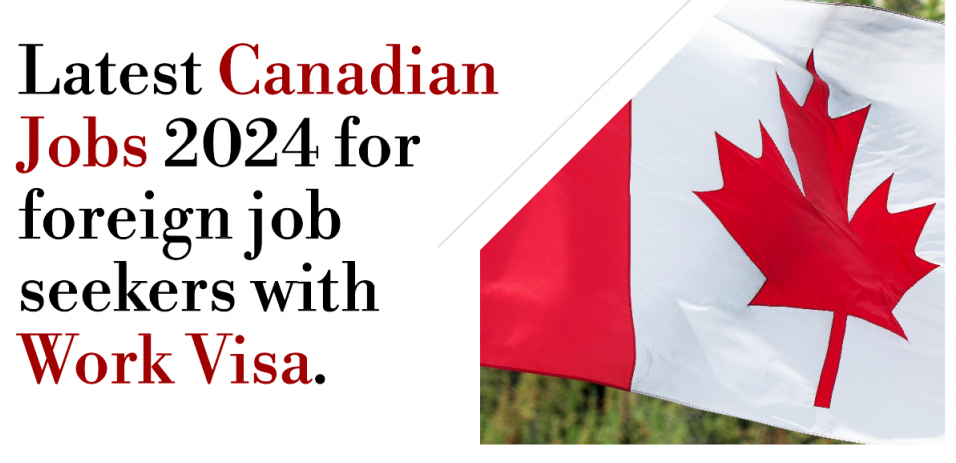Best Jobs in Canada for Foreigners 2024
[wp_ad_camp_1]
Canada has long been a land of opportunity for people from around the world, and this trend continues in 2024. The country’s robust economy, high standard of living, and multicultural society make it an attractive destination for foreigners seeking employment. Whether you’re a skilled worker, a professional, or someone looking for a new start, Canada offers a wide range of job opportunities across various industries.

One of the key aspects of job hunting in Canada is understanding the job market and identifying sectors that are not only thriving but also receptive to foreign workers. Industries like technology, healthcare, engineering, and finance are particularly prominent, each offering unique and rewarding career paths. Additionally, Canada’s emphasis on diversity and inclusion in the workplace means that foreign workers are often welcomed and valued for the different perspectives and skills they bring.
[wp_ad_camp_2]
Top Industries in Canada for Foreign Workers
Canada’s job market in 2024 continues to be diverse and welcoming to foreign workers, with several industries standing out as particularly promising. Understanding these key sectors can provide valuable insights for those looking to start or advance their careers in Canada.
Technology and IT
The Technology and Information Technology sector in Canada is thriving, driven by innovation and a growing demand for digital solutions. This sector is particularly open to foreign talent, with a variety of roles available, ranging from software development to IT project management and cybersecurity. The Canadian tech industry is known for its cutting-edge projects and a dynamic work environment, making it an attractive option for those with a passion for technology and innovation.
Healthcare
Healthcare remains one of Canada’s most vital sectors, and the demand for skilled healthcare professionals is on the rise. This industry offers a range of opportunities for foreign workers, including roles such as registered nurses, medical laboratory technicians, and healthcare administrators. Working in healthcare in Canada can be highly rewarding, offering the chance to make a significant impact on the well-being of communities while enjoying a stable and gratifying career.
Engineering
Engineering is another sector where foreign expertise is highly valued in Canada. With a focus on building and maintaining the country’s infrastructure, as well as advancing technological innovation, engineering offers diverse opportunities. Fields like civil, mechanical, and electrical engineering are particularly in demand. Engineers in Canada are respected for their technical skills and play a crucial role in shaping the country’s future.
Finance and Banking
The finance and banking sector in Canada is robust and offers a stable environment for career growth. This industry is ideal for individuals with a knack for numbers and a deep understanding of financial markets. Roles such as financial analysts, accountants, and bank managers are in high demand, offering foreign professionals the opportunity to work in one of the world’s most stable and well-regulated financial systems.
Apply this: Urgent Air Canada Jobs Toronto (New Update 2023 2024) Apply Now
Technology and IT Jobs
The Technology and IT sector in Canada is a vibrant and rapidly evolving field, offering numerous opportunities for skilled professionals. In 2024, three particular roles stand out for foreign workers looking to build a career in this dynamic environment: Software Developer, IT Project Manager, and Cybersecurity Specialist.
[wp_ad_camp_1]
Software Developer
Software Developers are in high demand in Canada’s tech industry. These professionals are responsible for designing, testing, and developing software applications. A career in software development offers a creative and challenging work environment, where one can work on various projects ranging from web applications to mobile apps and enterprise software solutions. This role requires strong programming skills, a knack for problem-solving, and an ability to adapt to new technologies and methodologies.
IT Project Manager
IT Project Managers play a crucial role in ensuring the successful delivery of technology projects. They oversee the planning, execution, and completion of IT projects, ensuring that they meet specified requirements and are delivered on time and within budget. This role requires a combination of technical knowledge and management skills. An IT Project Manager must be adept at coordinating teams, managing resources, and communicating effectively with stakeholders.
Cybersecurity Specialist
With the increasing importance of digital security, Cybersecurity Specialists have become essential in protecting an organization’s information systems against cyber threats. These professionals are responsible for analyzing security measures, implementing protective strategies, and responding to security breaches. A career in cybersecurity offers a dynamic and constantly evolving work environment, where one needs to stay ahead of the latest threats and technologies. This role requires a deep understanding of network structures, encryption technologies, and security protocols.
Healthcare Opportunities
The healthcare sector in Canada offers a range of rewarding career opportunities for foreign workers. In 2024, key roles in high demand include Registered Nurse, Medical Laboratory Technician, and Healthcare Administrator.
[wp_ad_camp_2]
Registered Nurse
Registered Nurses (RNs) are at the forefront of providing essential healthcare services in Canada. They play a critical role in patient care, offering clinical support, health education, and emotional support to patients and their families. RNs work in a variety of settings, including hospitals, clinics, and community health organizations. This career requires a combination of clinical skills and compassion, with a strong emphasis on patient care.
Medical Laboratory Technician
Medical Laboratory Technicians are vital in the diagnostic process, conducting essential tests that inform patient care and treatment. These professionals work in laboratory settings, handling and analyzing samples, and operating laboratory equipment. This role is crucial in providing accurate and timely data to healthcare professionals, and it requires technical expertise, attention to detail, and a commitment to maintaining high standards of laboratory practice.
Healthcare Administrator
Healthcare Administrators play a key role in managing healthcare facilities and ensuring they operate efficiently. They are responsible for overseeing staff, managing budgets, and ensuring that patients receive quality care. This career is ideal for those who have a blend of management skills and an understanding of the healthcare system. It offers the opportunity to make a significant impact on healthcare delivery and patient outcomes.
Engineering Careers
In the field of engineering, Canada offers excellent opportunities for Civil Engineers, Mechanical Engineers, and Electrical Engineers. Jobs in Canada for Foreigners 2024
[wp_ad_camp_1]
Civil Engineer
Civil Engineers are involved in designing, constructing, and maintaining the infrastructure that is essential to Canada’s cities and communities. This includes roads, bridges, buildings, and water systems. This role requires a strong understanding of engineering principles, project management, and environmental considerations. Civil Engineers in Canada can expect to work on a variety of projects, contributing to the country’s development and sustainability.
Mechanical Engineer
Mechanical Engineers in Canada work on designing, developing, and testing mechanical devices. This includes everything from engines and tools to heating and cooling systems. They play a critical role in various industries, such as manufacturing, automotive, and energy. Mechanical Engineering requires creativity, technical expertise, and an ability to solve complex problems.
Electrical Engineer
Electrical Engineers are responsible for designing and developing electrical systems and equipment. This can range from small-scale electronic devices to large power networks. In Canada, Electrical Engineers work in various sectors, including energy, telecommunications, and consumer electronics. This career demands a deep understanding of electrical theory, as well as practical skills in design and analysis.
Apply this: Urgent Air Canada Jobs Toronto (New Update 2023 2024) Apply Now
Finance and Banking Roles
The finance and banking sector in Canada offers robust career paths for Financial Analysts, Accountants, and Bank Managers. Jobs in Canada for Foreigners 2024
[wp_ad_camp_2]
Financial Analyst
Financial Analysts in Canada play a crucial role in helping businesses and individuals make informed financial decisions. They analyze financial data, forecast economic trends, and provide advice on investment opportunities. This role requires strong analytical skills, a deep understanding of financial markets, and an ability to communicate complex information clearly.
Accountant
Accountants are essential in managing financial records and ensuring compliance with tax laws and regulations. In Canada, they work across various industries, handling tasks like auditing, tax preparation, and financial reporting. This career requires attention to detail, expertise in accounting principles, and integrity.
Bank Manager
Bank Managers oversee the operations of bank branches, ensuring efficient service delivery and customer satisfaction. They manage staff, develop business strategies, and ensure compliance with banking regulations. This role combines financial knowledge with leadership skills, offering a challenging yet rewarding career in the financial sector.
Requirements for Working in Canada
For foreign workers aiming to pursue career opportunities in Canada in 2024, understanding the legal and professional requirements is essential. The primary considerations include obtaining the appropriate work permits and visas, as well as meeting the required qualifications and certifications for your chosen profession. Jobs in Canada for Foreigners 2024
Work Permits and Visas
To legally work in Canada, foreign nationals typically need to secure a work permit. There are two main types of work permits: open work permits and employer-specific work permits.
- Open Work Permits allow you to work for any employer in Canada and are not job-specific. These are generally issued under specific circumstances, such as to international students who have graduated from a Canadian institution or to the spouses of skilled workers.
- Employer-Specific Work Permits require a job offer from a Canadian employer. The permit will specify the employer you can work for, how long you can work, and where (if applicable). The employer may need to obtain a Labour Market Impact Assessment (LMIA) to hire a foreign worker, proving that there is a need for a foreign worker to fill the job and that no Canadian worker is available to do the job.
[wp_ad_camp_1]
Qualifications and Certifications
Depending on your profession, you may need specific qualifications and certifications to work in Canada. These requirements ensure that all professionals meet the national standards of practice and competency.
- Regulated Professions: For regulated professions, such as healthcare, engineering, and accounting, you must be certified or licensed by the relevant regulatory body in the province or territory where you plan to work. This often involves assessments of your educational credentials, examinations, and sometimes additional training or experience.
- Non-Regulated Professions: For non-regulated professions, while formal certification may not be mandatory, employers may have specific requirements or preferences regarding qualifications. It’s advisable to research the norms within your industry in Canada.
- Educational Credential Assessment (ECA): For foreign workers, getting an ECA for your foreign degree, diploma, or certificate is often necessary, especially if you are applying for a work permit or permanent residency through the Express Entry system. An ECA verifies that your foreign education is valid and equivalent to Canadian standards.
Navigating Immigration Policies
For foreigners looking to work in Canada in 2024, understanding the immigration policies is crucial. Two significant pathways that facilitate this process are the Express Entry system and the Provincial Nominee Programs (PNPs). These programs are designed to streamline the immigration process for skilled workers and professionals who can contribute to Canada’s economy. Jobs in Canada for Foreigners 2024
Express Entry
Express Entry is a system used by the Canadian government to manage applications for permanent residence from skilled workers. It is one of the fastest routes to gaining permanent residency in Canada. The system ranks candidates based on various factors including age, education, work experience, and language proficiency in English or French. The highest-ranking candidates are then invited to apply for permanent residency.
There are three main immigration programs under Express Entry: Jobs in Canada for Foreigners 2024
- Federal Skilled Worker Program (FSWP): For skilled workers with foreign work experience who want to immigrate to Canada permanently.
- Federal Skilled Trades Program (FSTP): For skilled workers who want to become permanent residents based on being qualified in a skilled trade.
- Canadian Experience Class (CEC): For skilled workers who have Canadian work experience and want to become permanent residents.
To apply through Express Entry, you first need to create a profile and be eligible under one of these programs. Your profile will then be ranked in the Express Entry pool using a points-based system known as the Comprehensive Ranking System (CRS).
[wp_ad_camp_2]
Provincial Nominee Programs (PNPs)
The Provincial Nominee Programs allow Canadian provinces and territories to nominate individuals who wish to immigrate to Canada and who are interested in settling in a particular province. Each Canadian province and territory has its own unique PNP designed to meet its specific economic and demographic needs.
PNPs are a popular choice for those who have a specific Canadian province in mind where they want to live and work. Many PNPs have streams aligned with the Express Entry system, but they also have unique streams with different criteria, such as connections to the province, job offers in the province, or skills that are in demand in the province.
Candidates who receive a provincial nomination through an Express Entry-aligned PNP stream receive additional CRS points, significantly increasing their chances of receiving an invitation to apply for permanent residency. Jobs in Canada for Foreigners 2024
Language Requirements: English and French Proficiency
For foreign workers seeking employment in Canada in 2024, proficiency in one or both of Canada’s official languages, English and French, is an essential aspect of the immigration and employment process. These language skills are not only important for daily communication but also play a significant role in the professional environment and in navigating the immigration system.
English Proficiency
English is one of the two official languages of Canada and is widely spoken across the country. Proficiency in English is crucial for most jobs, especially in the Technology, Healthcare, Engineering, and Finance sectors. Demonstrating your English language skills is often a requirement for obtaining work permits, and it is also a key factor in the Express Entry system for permanent residency.
Candidates are usually required to take a language test, such as the International English Language Testing System (IELTS) or the Canadian English Language Proficiency Index Program (CELPIP), to prove their language skills. The test scores are used to assess the candidate’s ability to effectively communicate in the workplace and integrate into Canadian society.
[wp_ad_camp_2]
French Proficiency
French is the other official language of Canada and is predominantly spoken in the province of Quebec, as well as in parts of New Brunswick and other regions. For those planning to work in these areas, or for roles requiring bilingualism, proficiency in French is highly beneficial. Similar to English, proficiency in French can be demonstrated through standardized language tests like the Test d’évaluation de français (TEF) or the Test de connaissance du français (TCF).
In the context of immigration, proficiency in both English and French is advantageous, as it can lead to additional points in the Express Entry system. Bilingual candidates are often seen as having a greater ability to adapt to different work environments and cultural settings in Canada.
Adapting to the Canadian Work Culture
For foreign workers in Canada in 2024, adapting to the Canadian work culture is a crucial aspect of professional success and personal satisfaction. This involves understanding and embracing the nuances of Canadian workplace etiquette, as well as the country’s strong commitment to diversity and inclusion.
Understanding Canadian Workplace Etiquette
Canadian workplace culture is characterized by a blend of professionalism and approachability. Key elements to understand include:
- Communication: Canadians typically prefer clear, polite, and direct communication. While being assertive is appreciated, it’s important to maintain politeness and respect. Small talk and personal interactions are common and help in building workplace relationships.
- Punctuality: Time is valued in the Canadian workplace. Being on time for meetings and appointments is considered a sign of respect and professionalism.
- Work-Life Balance: Canada places a significant emphasis on work-life balance. Employers usually respect personal time and family commitments, and employees are encouraged to take advantage of their entitled leaves and vacation time.
- Feedback and Collaboration: Canadian work culture encourages open communication and teamwork. Feedback is often given constructively, and collaboration is seen as a key to success.
- Problem-Solving and Initiative: Canadian employers value employees who are proactive, can think critically, and solve problems efficiently. Taking the initiative and being innovative are highly regarded traits.
[wp_ad_camp_1]
Embracing Diversity and Inclusion
Canada is known for its diverse population and inclusive society. In the workplace, this translates to:
- Cultural Sensitivity: Understanding and respecting different cultures, customs, and perspectives is vital. Canadian workplaces are often multicultural, and embracing this diversity can lead to a more enriching work experience.
- Inclusive Practices: Many Canadian organizations have policies to ensure inclusivity and equal opportunities for all employees, regardless of their background, gender, age, or sexual orientation.
- Adapting to Bilingual Environments: In some parts of Canada, especially in Quebec, workplaces are bilingual. Being open to working in both English and French, where applicable, is an asset.
- Recognition of International Experience and Skills: Canadian employers increasingly recognize the value of international experience and diverse skill sets that foreign workers bring to the table.
Work-Life Balance in Canada
In 2024, maintaining a healthy work-life balance remains a cornerstone of the Canadian work culture. This balance is supported by various employee benefits and entitlements that are standard across many industries. Understanding these benefits can help foreign workers in Canada better integrate into the workforce and manage their personal and professional lives effectively.
Employee Benefits
- Vacation Time: Canadian labor laws mandate a minimum amount of paid vacation time for employees. The specific amount can vary by province, but generally, workers are entitled to at least two weeks of paid vacation per year, increasing with years of service.
- Parental Leave: Canada is known for its generous parental leave policies. Both mothers and fathers are entitled to take leave during the birth or adoption of a child, with a significant portion of this leave being paid. This policy allows parents to spend time with their newborn or newly adopted children without the stress of losing their income.
- Health Benefits: Many employers in Canada offer health insurance plans that cover a range of medical expenses not covered by the public healthcare system. These benefits often include prescription medications, dental care, vision care, and sometimes alternative therapies.
- Retirement Plans: Employer-sponsored retirement plans, like pension plans or group Registered Retirement Savings Plans (RRSPs), are common. These plans help employees save for their retirement, often with contributions matched by the employer.
- Flexible Working Arrangements: With the evolving work landscape, many Canadian employers offer flexible working arrangements. This includes options like telecommuting, flexible hours, and compressed workweeks, allowing employees to balance work with personal responsibilities more easily.
Entitlements
- Statutory Holidays: Canada observes several statutory holidays, like Canada Day and Labour Day, during which employees are entitled to a day off with pay.
- Sick Leave: Employees are typically entitled to a number of paid sick days per year. The specifics can vary depending on the province and the employer, but this entitlement allows workers to take time off when they are ill without losing their income.
- Maternity and Paternity Benefits: Through the Canadian Employment Insurance program, eligible parents can receive financial benefits during maternity or paternity leave. These benefits are designed to partially compensate for lost income during this period.
- Mental Health Support: Recognizing the importance of mental health, many Canadian employers offer support services such as employee assistance programs, which provide confidential counseling and support for personal and work-related issues.
[wp_ad_camp_2]
Resources for Job Hunting
In 2024, for foreign workers seeking employment in Canada, leveraging various job hunting resources can significantly enhance their chances of finding suitable positions. Networking and engaging with professional groups are among the most effective strategies in this endeavor.
Online Job Portals
Online job portals are a primary resource for job seekers in Canada. These platforms list a wide range of job opportunities across various industries and locations. Some popular job search websites include:
- Indeed Canada: Offers a comprehensive list of job postings across the country, catering to various industries and experience levels.
- LinkedIn: Apart from job listings, LinkedIn provides networking opportunities and insights into company cultures and employee experiences.
- Job Bank: This is the Canadian government’s job site, providing listings as well as labor market information.
Using these portals, job seekers can filter searches based on location, industry, job type, and level of experience, making it easier to find relevant opportunities.
Networking
Networking remains a powerful tool in the job search process. Building professional relationships can lead to new opportunities and valuable insights about the Canadian job market. Here are some ways to network:
- LinkedIn: Use LinkedIn to connect with industry professionals, join groups, and participate in discussions. It’s a great platform to showcase your professional profile and connect with potential employers or referrals.
- Professional Associations: Joining professional associations related to your field can provide networking opportunities and access to industry-specific job listings.
- Networking Events: Attend career fairs, industry conferences, and networking events where you can meet professionals and learn about job openings.
Professional Groups
Professional groups, both online and offline, can be invaluable in providing support, advice, and job leads. These groups often include industry-specific organizations and community groups that host events, workshops, and seminars. They can be found through:
- Industry-Specific Associations: Joining associations relevant to your profession can provide you with industry insights, professional development resources, and networking opportunities.
- Meetup Groups: Platforms like Meetup.com host groups for a variety of professional interests and can be a great way to meet people in your field or area of interest.
- Alumni Associations: If you studied in Canada or even abroad, your alumni association can be a great resource for networking and finding job opportunities.
Apply Also: Urgent Firefighter Jobs Canada (New Update 2023 2024) Apply Now
Preparing Your Resume for the Canadian Job Market
For foreign workers seeking employment in Canada in 2024, tailoring your resume to align with Canadian standards is a crucial step in the job application process. The Canadian job market has specific expectations for resumes, and understanding these nuances can significantly increase your chances of securing an interview.
[wp_ad_camp_1]
Format and Length
- Conciseness: Canadian employers typically prefer concise resumes, ideally two pages or less. It’s important to be succinct while still providing enough detail to showcase your skills and experience.
- Chronological Format: Use a reverse-chronological format, listing your most recent experience first. This format is preferred as it easily shows your career progression.
- Clarity and Readability: Use clear headings and bullet points to make your resume easy to read. Avoid dense blocks of text.
Content
- Personal Information: Include your name, contact information (phone number and email), and LinkedIn profile if applicable. Do not include personal information like your age, marital status, or a photo, as this is not customary in Canada.
- Professional Summary: Start with a brief summary or objective that highlights your key skills and career goals. This should be tailored to the specific job you are applying for.
- Work Experience: List your work experiences, focusing on achievements and responsibilities relevant to the job you’re applying for. Use action words and quantify achievements where possible.
- Education: Include your highest level of education. If your degree is from a non-Canadian institution, you may want to note its Canadian equivalent. Including an Educational Credential Assessment (ECA) can be beneficial.
- Skills: Highlight specific skills relevant to the job, including technical skills, languages, and any certifications.
- Volunteer Work and Extracurricular Activities: These can be included, especially if they are relevant to the job or demonstrate transferable skills.
Customization for Job Applications
- Tailoring: Customize your resume for each job application. Highlight experiences and skills that are most relevant to the job description.
- Keywords: Use keywords from the job posting in your resume. Many Canadian employers use Applicant Tracking Systems (ATS) to screen resumes, and these systems scan for specific keywords related to the job.
Formatting and Design
- Professional Style: Opt for a clean and professional design. Avoid overly artistic or complex layouts, unless you are applying for a role in a creative field.
- File Format: Save your resume in a widely accepted format like PDF to ensure it retains its formatting.
Proofreading
- Error-Free: Ensure your resume is free from spelling or grammatical errors. Consider having it proofread by a native English or French speaker, depending on the job location.
[wp_ad_camp_2]
Challenges and Opportunities
For foreign workers in Canada in 2024, navigating the professional landscape involves encountering both challenges and opportunities. Understanding how to overcome cultural barriers and recognizing the potential for long-term career growth are key aspects of this journey.
Overcoming Cultural Barriers
Adapting to a new cultural environment can be one of the biggest challenges for foreign workers in Canada. However, overcoming these barriers is crucial for professional success and personal fulfillment.
- Cultural Awareness: Familiarize yourself with Canadian customs, social norms, and workplace etiquette. This understanding can help in avoiding misunderstandings and in building positive relationships with colleagues and clients.
- Communication Skills: Effective communication is key. This includes not only language proficiency but also understanding non-verbal cues and the subtleties of Canadian communication styles, which often emphasize politeness and indirectness.
- Networking: Engage with diverse groups and participate in community events or professional associations. This not only helps in building a professional network but also in understanding different cultural perspectives.
- Seeking Support: Don’t hesitate to seek support or advice from mentors, coworkers, or professional counselors who can provide guidance on navigating cultural differences.
Long-term Career Prospects
Canada offers excellent long-term career prospects for skilled foreign workers, but it requires strategic planning and continuous development.
- Career Advancement: Many sectors in Canada offer good opportunities for career progression. Stay updated with industry trends, and be proactive in seeking opportunities for advancement, whether through additional training, networking, or taking on new responsibilities.
- Continual Learning: Embrace lifelong learning. This could mean pursuing further education, obtaining additional certifications, or staying abreast of technological advancements and industry best practices.
- Workplace Integration: Fully integrating into the workplace and embracing the work culture can open doors to more opportunities. This includes understanding and aligning with the organization’s values and building strong working relationships.
- Exploring Different Pathways: Be open to exploring different career paths. Sometimes the best opportunities come from unexpected changes or lateral moves.
[wp_ad_camp_2]
Conclusion: Jobs in Canada for Foreigners 2024
As we look at the landscape of job opportunities in Canada for foreigners in 2024, it’s clear that the country continues to offer a diverse array of career options across various thriving industries. Key sectors such as Technology and IT, Healthcare, Engineering, and Finance and Banking stand out as particularly promising areas for foreign professionals.
Within these sectors, roles like Software Developers, IT Project Managers, Cybersecurity Specialists, Registered Nurses, Medical Laboratory Technicians, Healthcare Administrators, Civil Engineers, Mechanical Engineers, Electrical Engineers, Financial Analysts, Accountants, and Bank Managers are in high demand. These positions not only offer competitive salaries and benefits but also provide opportunities for growth and professional development.
Apply this: Urgent Air Canada Jobs Toronto (New Update 2023 2024) Apply Now
FAQs: Best Jobs in Canada for Foreigners 2024
[wp_ad_camp_1]
1. What types of work permits are available for foreign workers in Canada?
There are mainly two types of work permits in Canada: open work permits and employer-specific work permits. Open work permits allow you to work for any employer in Canada, while employer-specific work permits are tied to a specific employer.
2. Do I need a Canadian degree to work in Canada?
While having a Canadian degree can be beneficial, it’s not a mandatory requirement for all jobs. For certain regulated professions, however, you may need to get your credentials assessed and recognized in Canada.
3. How can I find job opportunities in Canada from abroad?
You can search for jobs using Canadian job portals like Indeed Canada, Job Bank, and LinkedIn. Networking and connecting with industry professionals through platforms like LinkedIn can also be helpful.
[wp_ad_camp_2]
4. What is the Express Entry system for immigration to Canada?
The Express Entry system is a points-based immigration system used by the Canadian government to manage applications for permanent residence from skilled workers.
5. Are language skills important for working in Canada?
Yes, proficiency in English and/or French is important for most jobs in Canada. Your language skills may also impact your immigration points under systems like Express Entry.
6. How is the work-life balance in Canada?
Canada is known for valuing work-life balance. This is reflected in its labor laws and workplace cultures, which typically offer paid vacation time, parental leave, and other benefits.
7. Can I bring my family with me if I move to Canada for work?
Yes, when you apply for a work permit, you can also apply for permits for your family members (spouse and dependent children) to accompany you.
8. Is healthcare available to foreign workers in Canada?
Access to healthcare for foreign workers depends on the province or territory and the type of work permit. In many cases, foreign workers are eligible for public health insurance.
9. What is the average salary for jobs in Canada?
The average salary varies widely depending on the industry, role, and region. Websites like Glassdoor and Payscale can provide specific salary information based on job titles and locations.
10. What cultural aspects should I be aware of in the Canadian workplace?
Canadian workplaces value politeness, punctuality, inclusivity, and collaboration. Understanding and adapting to these cultural norms is important for success in the Canadian work environment.
[wp_ad_camp_1]
Best Jobs in Canada for Foreigners 2024
Check This: Walk in Interview in UAE With Visa Sponsorship 2023 2024




